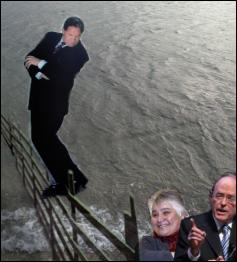Flashback: National And The Seabed and
Foreshore

At present there is much heated speculation that National is courting the Maori Party and offering concessions regarding the Foreshore and Seabed legislation - legislation passed with New Zealand First's support in late 2004 - Scoop has taken a trip down memory lane and pulled out some of the choicer quotes made during the passing of this controversial Bill.
When the Foreshore and Seabed legislation had its first reading in May 2004 National leader Don Brash considered the Bill would be a 'poison pill' for Maori that would allow them to 'interfere with the rights of other New Zealanders.'
Dr Brash pointed out to the House that in his opinion it was clear to "New Zealanders that the Crown owned the foreshore and the seabed, and that those areas could not be alienated from the Crown without a specific Act of Parliament."
In his final speech on the matter in late November 2004, as the Foreshore and Seabed legislation was passing its final few votes, Dr Brash considered Labour should have crossed the floor and asked for his party's help regarding the legislation - right from the get go.
"[Labour] initially said that it would legislate to ensure that the foreshore and seabed belonged to all New Zealanders…I have no doubt at all that the National Party would have agreed to do exactly that," explained Dr Brash to a weary House that had been sitting for three long days.
The parts of the Bill that dealt with ancestral connection seemed to particularly concern Dr Brash.
"The National Party wants to see all New Zealanders—Mâori, Pâkehâ, Pacific Island, Asian, young, old, men, and women—treated as equal before the law, with a foreshore and seabed owned by all of us, not by people who chance to have one Mâori ancestor," Dr Brash told the House.
National MP Wayne Mapp was probably filled with pride in his party's opposition to the legislation and the way it was dealing with race relations when he declared the issue was a 'line in the sand' for National.
"National has drawn a line in the sand on this issue, and we believe in a single, simple principle. For the area of the public domain—if one will—that we all use, we believe in Crown ownership on behalf of all New Zealanders. It should not be sold, but should be kept for the public enjoyment of all New Zealanders, irrespective of race" Dr Mapp told the House on Thursday 18 November 2004.
Other National MPs were incensed at what they considered was preferential treatment being shown to Maori. Sandra Goudie told tales of family members being jostled while fishing.
"The precedent given to Mâori in legislation is chronically out of control in this country. That is an absolute disgrace to the representation that this Parliament is supposed to provide to the New Zealanders of this great nation. Certainly, they are not getting that representation here today from either the Government or New Zealand First.
That is a disgrace. I have had family who have been fishing off the beaches and who have been jostled by people who think that they have a greater claim to this country than my family has, in spite of the many, many generations of our presence here in this country," declared a no doubt exasperated and het up Ms Goudie.
The claims of jostling and beach confrontations were also taken up by National's John Carter.
"At Karikari Peninsula, it is happening right now. White people—non-Mâori people—cannot drive up to Karikari Peninsula. They are excluded from it. It is a public beach and they are not able to go on it. They are shunted off, bullied off, and railroaded off.
Believe me, that will happen more and more as this issue starts getting debated over Christmas and as Mâori people’s expectations start getting more and more heightened. When they look at this bill they know that the Government is giving them something extra over and above non-Mâori,"explained a no doubt het up and exasperated Mr Carter.
Besides bagging the Labour Government regarding the Seabed and Foreshore legislation National MPs sprayed their colleagues on the opposition benches, NZ First, with plenty of angry vitriol. National's leader probably still smarting from being compared to a 'colonial tea planter' by Winston Peters went in boots and all.
"Which party has made this deal possible? New
Zealand First. What an extraordinary name for a party that
has sold New Zealand and New Zealanders down the river. It
has sold us into a world of increased racial division,
increased racial tension, and increased racial dissent by
signing up to this sordid deal," railed Dr Brash in easy
earshot of his opposition 'friends'.
Other National MPs took the time to correctly forecast Mr Peters demise as the MP for Tauranga, politely assuring Mr Peters that National's Tauranga candidate Bob Clarkson was well ahead in the polls. National MP Nick Smith, a man always known to get hot under the collar when Maori spirituality and land access is discussed, asked this presumably rhetorical question.
"So how can Winston Peters and his crew of fools from New Zealand First stand up in this Chamber and pretend that public access will be guaranteed?"
NZ First MP Ron Mark then assured Mr Smith being called a fool had "mortally wounded" him. Mr Mark then rather impolitely asked if Mr Smith could withdraw the remark, otherwise Mr Mark told the Hosue he would consider Dr Smith was "a bigger idiot than we already know he is."
Whilst most
parties seemed to have wildly divergent ideas regarding what
exactly should happen with the Foreshore and Seabed -
National's Maori Affairs spokesperson Gerry Brownlee did
seem to extend a tiny olive twig (rather than a branch) to
Tariana Turia - late in the concluding stages of the third
readings.
Mr Brownlee pointed out, however, that it was ironic that National was in agreement with Ms Turia and the Maori party.
"The National Party does not support this legislation, has not supported this legislation, and will not be supporting this legislation in the future. Is it not an irony that the National Party today finds itself in agreement with the Mâori Party? It is quite an irony.
If one looks at the commentary on the bill and sees the report back of the Fisheries and Other Sea-related Legislation Committee, one will notice that the New Zealand National Party put in its minority view that the way to fix this issue was to deal with Te Ture Whenua Maori Act and to take a look at the Resource Management Act. Both of those pieces of legislation were just offered to the House as solutions by Tariana Turia from the Mâori Party,"Mr Brownlee told the House.
Perhaps the above words may help to shed some light on the regular meetings Mr Brownlee, Dr Brash and Ms Georgina Te Hu Heu are having with the Maori Party.
ENDS



 Ramzy Baroud: The World Owes Palestine This Much - Please Stop Censoring Palestinian Voices
Ramzy Baroud: The World Owes Palestine This Much - Please Stop Censoring Palestinian Voices Dee Ninis, The Conversation: Why Vanuatu Should Brace For Even More Aftershocks After This Week’s Deadly Quakes: A Seismologist Explains
Dee Ninis, The Conversation: Why Vanuatu Should Brace For Even More Aftershocks After This Week’s Deadly Quakes: A Seismologist Explains Martin LeFevre - Meditations: Meditation Without A Method
Martin LeFevre - Meditations: Meditation Without A Method Ramzy Baroud: Israel To Annex The West Bank – Why Now? And What Are The Likely Scenarios?
Ramzy Baroud: Israel To Annex The West Bank – Why Now? And What Are The Likely Scenarios? Binoy Kampmark: The Strawman Of Antisemitism - Banning Protests Against Israel Down Under
Binoy Kampmark: The Strawman Of Antisemitism - Banning Protests Against Israel Down Under Gordon Campbell: On The Coalition’s Empty Gestures, And Abortion Refusal As The New Slavery
Gordon Campbell: On The Coalition’s Empty Gestures, And Abortion Refusal As The New Slavery